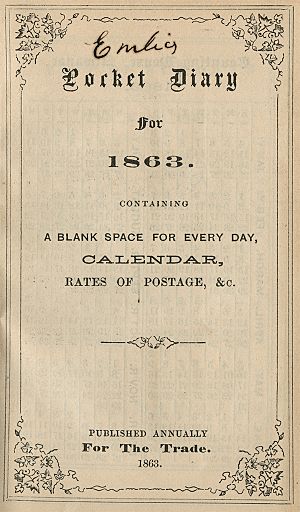Emilie Davis facts for kids
Quick facts for kids
Emilie Frances Davis
|
|
|---|---|
| Born | February 18, 1839 Lancaster County, Pennsylvania, US |
| Died | December 26, 1889 (aged 50) Philadelphia, Pennsylvania |
| Resting place | Lebanon Cemetery |
| Occupation |
|
| Language | English |
| Education | Institute for Colored Youth |
| Period | 1863–1965 |
| Subject | Diary |
| Relatives | Jacob C. White Jr. (brother-in-law) |
Emilie "Emily" Frances Davis (born February 18, 1839 – died December 26, 1889) was a free African American woman. She lived in Philadelphia during the American Civil War. Emilie wrote three small diaries from 1863 to 1865. These diaries share her thoughts on big events like the Emancipation Proclamation and the Battle of Gettysburg. They also show how people felt after President Lincoln died. Her diaries are special because they show what life was like for Black women in cities during the 1800s. They also tell us how people reacted to the Civil War.
Contents
Emilie Davis's Early Life and School
Emilie Davis was born free in Pennsylvania in 1839. Her father, Isaac Davis, moved to Pennsylvania from Maryland. We don't know much about her mother. Her family lived in Lancaster and Schuylkill counties. By 1860, they moved to the Seventh Ward of Philadelphia. This was the first time Emilie was listed in the census records there.
In 1860, over 13,000 free Black women lived in Philadelphia County. The Seventh Ward was a busy center for African American life. It was important for politics, culture, and religion. Emilie went to the Institute for Colored Youth. She also went to several Black churches. Before she got married, she worked as a house helper and a seamstress. Emilie was part of the Ladies' Union Association of Philadelphia. This group helped raise money and supplies for the U.S. Colored Troops.
What Emilie Davis Wrote About
In her diaries from 1863 to 1864, Emilie wrote about getting ice cream four times. This shows that Black people in Philadelphia were starting to have more freedom. Before this, in 1857, Charlotte Forten and a friend were turned away from three ice cream shops.
Emilie also wrote about interesting talks and concerts she went to. On January 25, 1865, she heard J. Sella Martin speak. He was a former slave and a powerful minister. On February 16, 1865, she listened to Frederick Douglass. On February 27, 1865, she heard Frances Ellen Watkins Harper give a lecture. Emilie went to a concert by Elizabeth Taylor Greenfield on May 11, 1964. On September 14, 1865, she attended a concert by Thomas Wiggins. She had to sit in a separate section for Black people, in the balcony.
Emilie Davis's Family Life
On December 13, 1866, Emilie married George Bustill White. He was a barber and worked for civil rights. George's father, Jacob C. White Sr., was a well-known Black businessman. Emilie's brother-in-law was Jacob C. White Jr.. He helped start the Philadelphia Pythians, a Black baseball team. He also became the principal of the all-Black Roberts Vaux Junior High School.
George White was active in the Pennsylvania Equal Rights League. This group worked to get state support for new civil rights laws. They also helped make sure that Philadelphia's streetcars allowed Black people to ride in 1867.
Emilie and George had six children: Jacob C. White (born 1867), Maria, Emilie (born 1873), George (born 1875), Carry (born 1877), and Julia (born 1881). In 1880, Emilie's job was listed as "housekeeper." Later in life, she gave money to her church. She also rented a church pew in her own name. This shows that she was part of the Black middle class.
When Emilie Davis Died
Emilie Davis died on December 26, 1889. She was buried at Lebanon Cemetery. This cemetery was also the burial place of Octavius Catto and other important civil rights leaders. In 1903, Lebanon Cemetery closed. Emilie was then moved to an unmarked grave at Eden Cemetery in Collingdale, Pennsylvania.
Her husband, George White, died on June 1, 1899.
Where to Find Emilie Davis's Diaries
Emilie Davis's diaries have been put online by researchers. You can find them at the Historical Society of Pennsylvania. Pictures of the diary pages are also available online. You can see them on the websites of Pennsylvania State University and Villanova University. It is rare to find written accounts from Black American women from her time. This makes Emilie's diaries very special and important.
 | Victor J. Glover |
 | Yvonne Cagle |
 | Jeanette Epps |
 | Bernard A. Harris Jr. |


